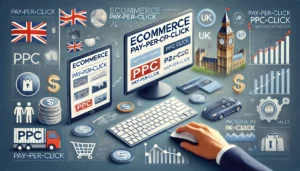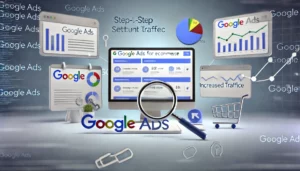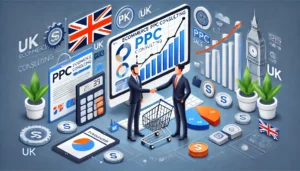Ecommerce PPC Consulting and Strategy You Need For Your UK Brands

Ecommerce PPC Consulting: In the bustling world of UK ecommerce, standing out can be a real challenge. That’s where Pay-Per-Click (PPC) advertising comes into play. This article will guide you through the essentials of ecommerce PPC consulting and strategy, helping your brand to not only compete but thrive in the digital marketplace.
Ecommerce PPC Consulting: Key Takeaways
- PPC advertising is a powerful tool for boosting your brand’s visibility and driving targeted traffic to your website.
- Choosing the right PPC agency is crucial for the success of your ecommerce campaigns.
- Google Ads and Google Shopping are essential platforms for any robust ecommerce PPC strategy.
- Advanced techniques like remarketing and AI can significantly enhance the effectiveness of your PPC campaigns.
- Combining SEO and PPC efforts can lead to maximum impact and better overall results for your brand.
Understanding Ecommerce PPC Consulting and Strategy for UK Brands
What is Ecommerce PPC?
Ecommerce PPC, or Pay-Per-Click, is a type of online advertising where businesses pay a fee each time one of their ads is clicked. It’s a way of buying visits to your site, rather than attempting to earn those visits organically. For UK brands, this can be a game-changer in driving targeted traffic and increasing sales.
Importance of PPC for UK Ecommerce Brands
For UK ecommerce brands, PPC is crucial. It offers immediate visibility and can drive a significant amount of traffic to your website. By targeting specific keywords, you can attract users who are already interested in your products. This not only boosts your sales but also improves your brand’s online presence.
Ecommerce PPC Consulting: Key Components of a Successful PPC Strategy
A successful PPC strategy involves several key components:
- Keyword Research: Identifying the right keywords to target is essential.
- Ad Copy: Crafting compelling ad copy that attracts clicks.
- Landing Pages: Ensuring your landing pages are optimised for conversions.
- Budget Management: Allocating your budget effectively to maximise ROI.
A well-rounded PPC strategy can significantly enhance your ecommerce performance, making it easier to reach your marketing goals.
By focusing on these elements, UK brands can create PPC campaigns that not only drive traffic but also convert visitors into customers.
Choosing the Right PPC Agency for Your UK Ecommerce Brand
Qualities to Look for in a PPC Agency
When selecting a PPC ecommerce agency, it’s crucial to consider their expertise and track record. Experience in managing PPC campaigns for ecommerce brands is a must. Look for agencies that have a deep understanding of the UK market and can tailor strategies to your specific needs. A good agency should also be transparent with their pricing and offer a straightforward structure that prioritises your ROI.
Questions to Ask Potential PPC Agencies
Before committing to a London PPC agency, ask about their previous work and success stories. Inquire about their approach to managing budgets and how they handle unexpected challenges. It’s also important to understand their communication style and how often they will update you on campaign performance.
Evaluating PPC Agency Performance
To measure the effectiveness of a PPC agency, track key performance indicators (KPIs) such as click-through rates, conversion rates, and return on ad spend. Regularly reviewing these metrics will help you determine if the agency is meeting your goals. Additionally, consider requesting a free PPC audit to gain insights into potential areas for improvement.
Choosing the right PPC agency can significantly impact your brand’s success. Make sure to do thorough research and select an agency that aligns with your business goals and values.
The Role of Google Ads in Your Ecommerce PPC Strategy
Setting Up Google Ads for Ecommerce (Ecommerce PPC Consulting)
Setting up Google Ads for ecommerce is a crucial step in driving traffic to your online store. We start by creating a Google Ads account and linking it to your website. Next, we conduct thorough keyword research to identify the terms potential customers are searching for. This helps us create targeted ads that appear when users search for those keywords. A well-structured Google Ads campaign can significantly boost your visibility and sales.
Optimising Google Ads Campaigns
Optimising your Google Ads campaigns is essential for maximising your return on investment (ROI). We continuously monitor and adjust your bids, keywords, and ad copy to ensure optimal performance. Using tools like Google Ads PPC, we can track which ads are performing well and which need improvement. This ongoing process helps us stay ahead of the competition and make the most of your advertising budget.
Measuring Success with Google Ads
Measuring the success of your Google Ads campaigns involves tracking key metrics such as click-through rates (CTR), conversion rates, and cost per click (CPC). We use these metrics to evaluate the effectiveness of your campaigns and make data-driven decisions. Regular Google ads audits are also important to identify areas for improvement and ensure your campaigns are running smoothly. By keeping a close eye on these metrics, we can continually refine your strategy and achieve better results.
Ecommerce PPC Consulting: Leveraging Google Shopping for Ecommerce Success
Benefits of Google Shopping for Ecommerce
Google Shopping offers a unique way to showcase your products directly in search results. This visual format can significantly increase click-through rates and drive more traffic to your site. One of the key benefits is that it targets users who are already searching for products like yours, making it easier to convert clicks into sales. Additionally, Google Shopping ads often have a higher conversion rate compared to traditional text ads.
Setting Up Google Shopping Campaigns
Setting up a Google Shopping campaign involves several steps. First, you need to create a Google Merchant Centre account and upload your product feed. This feed should include all the necessary details about your products, such as titles, descriptions, prices, and images. Next, link your Merchant Centre account to your Google Ads account. Once linked, you can create a Shopping campaign in Google Ads, set your budget, and define your target audience. It’s crucial to regularly update your product feed to ensure that your ads display accurate information.
Optimising Product Listings for Better Performance
Optimising your product listings is essential for achieving better performance in Google Shopping. Start by ensuring that your product titles and descriptions are clear and include relevant keywords. High-quality images are also vital, as they can attract more clicks. Additionally, consider using custom labels to segment your products and create more targeted campaigns. Regularly review your campaign performance and make adjustments as needed to improve your return on investment.
Leveraging Google Shopping can be a game-changer for ecommerce brands. By showcasing products directly in search results, we can attract more targeted traffic and boost sales.
Effective keyword management is crucial for the success of your Google Shopping campaigns. Make sure to use tools like the Google Ads Keyword Planner to identify the best keywords for your products.
Advanced PPC Techniques for UK Ecommerce Brands
Remarketing Strategies
Remarketing is a powerful tool in ecommerce PPC. It allows us to target users who have previously visited our site but didn’t make a purchase. By showing them tailored ads, we can encourage them to return and complete their purchase. This strategy is particularly effective for boosting conversion rates and increasing overall sales.
Using AI and Machine Learning in PPC
Artificial Intelligence (AI) and Machine Learning (ML) are revolutionising PPC campaigns. These technologies help us analyse vast amounts of data to predict which ads will perform best. By leveraging AI and ML, we can optimise our ad spend and improve ROI. This means more efficient campaigns and better results for our ecommerce brands.
A/B Testing for PPC Campaigns (Ecommerce PPC Consulting)
A/B testing is essential for understanding what works best in our PPC campaigns. By creating two versions of an ad and testing them against each other, we can see which one performs better. This method helps us refine our ads, ensuring we get the most out of our ecommerce PPC efforts.
Advanced PPC techniques like remarketing, AI, and A/B testing are crucial for staying ahead in the competitive ecommerce landscape. They allow us to make data-driven decisions and continuously improve our campaigns.
Integrating SEO and PPC for Maximum Impact
Why SEO and PPC Work Well Together
SEO and PPC are like two sides of the same coin. While SEO focuses on organic traffic, PPC brings immediate visibility. Combining both can lead to a significant boost in your online presence. SEO builds long-term credibility, while PPC offers quick wins. Together, they cover all bases, ensuring your brand is always in front of potential customers.
Strategies for Combining SEO and PPC
- Keyword Synergy: Use PPC data to find high-performing keywords and integrate them into your SEO strategy.
- Unified Messaging: Ensure your PPC ads and SEO content share the same tone and message for consistency.
- Remarketing: Use PPC to retarget visitors who found you through organic search but didn’t convert.
- Data Sharing: Share insights between your SEO and PPC teams to refine both strategies.
Measuring the Combined Impact of SEO and PPC
To measure the success of integrating SEO and PPC, track the following metrics:
- Conversion Rate: See how many visitors from both channels are converting.
- Cost Per Acquisition (CPA): Measure the cost-effectiveness of your combined efforts.
- Organic and Paid Traffic: Monitor the increase in both organic and paid traffic.
- ROI: Calculate the return on investment from your integrated strategy.
By leveraging both SEO and PPC, we can create a comprehensive digital marketing strategy that maximises our reach and effectiveness. This dual approach ensures we capture both immediate and long-term opportunities, driving sustained growth for our brand.
Social Media Advertising as Part of Your PPC Strategy
Benefits of Social Media PPC
Social media platforms offer a unique opportunity to reach a broad audience. They allow us to target specific demographics, interests, and behaviours. This precision targeting can lead to higher engagement rates and better ROI. Social media PPC is also highly flexible, enabling us to adjust our campaigns in real-time based on performance data.
Best Platforms for Ecommerce PPC
Choosing the right platform is crucial. Each social media platform has its strengths:
- Facebook: Great for broad audience reach and detailed targeting options.
- Instagram: Ideal for visually appealing products and younger demographics.
- LinkedIn: Best for B2B marketing and professional services.
- Twitter: Useful for real-time engagement and trending topics.
- TikTok: Perfect for creative and viral content aimed at younger audiences.
Creating Effective Social Media Ads
Creating effective social media ads involves several key steps:
- Identify Your Goals: What do you want to achieve? More traffic, sales, or brand awareness?
- Know Your Audience: Use the platform’s targeting tools to reach the right people.
- Craft Compelling Content: Your ad should be visually appealing and have a clear call to action.
- Monitor and Adjust: Keep an eye on your ad’s performance and make necessary adjustments.
In today’s digital landscape, leveraging social media for PPC is not just an option but a necessity. With the decline in ad revenue seen by Meta for the first time in a decade, it’s clear that the digital advertising landscape is evolving. Brands must adapt to stay ahead.
By integrating social media advertising into our PPC strategy, we can maximise our reach and impact, ensuring our UK ecommerce brands thrive in a competitive market.
Amazon Ads and Their Role in Ecommerce PPC (Ecommerce PPC Consulting)
Introduction to Amazon Ads
Amazon Ads are a powerful tool for ecommerce brands. They allow us to place our products directly in front of customers who are ready to buy. This platform is unique because it targets shoppers who are already on Amazon, making it easier to convert clicks into sales. Amazon Ads can significantly boost our visibility and sales.
Setting Up Amazon PPC Campaigns
Setting up an Amazon PPC campaign involves several steps. First, we need to choose the right products to advertise. Next, we select relevant keywords that potential customers might use. After that, we set our budget and bid amounts. Finally, we monitor and adjust our campaigns to ensure they are performing well. This process helps us reach the right audience and maximise our return on investment.
Optimising Amazon Ads for Better ROI
Optimising Amazon Ads is crucial for getting the best return on investment. We start by analysing the performance data to see which ads are working and which are not. Then, we tweak our keywords, ad copy, and bids to improve performance. Regularly updating our product listings and ensuring they are accurate and appealing also helps. By doing this, we can make sure our ads are as effective as possible.
Amazon Ads are an essential part of our ecommerce strategy. They help us reach a large audience and drive sales effectively.
In conclusion, Amazon Ads play a vital role in our ecommerce PPC strategy. They offer a unique opportunity to target shoppers who are ready to buy, making them an invaluable tool for boosting our online sales.
Common Challenges in Ecommerce PPC and How to Overcome Them
Managing PPC Budget Effectively
One of the biggest challenges in ecommerce PPC is managing the budget effectively. We need to ensure that every pound spent is maximised for the best return on investment (ROI). Setting a clear budget and monitoring it regularly can help us avoid overspending. Using tools like Google Ads’ budget planner can also provide insights into how our budget is being utilised.
Dealing with Click Fraud
Click fraud is another significant issue that can drain our PPC budget. This happens when competitors or malicious users repeatedly click on our ads with no intention of purchasing. To combat this, we can use click fraud detection software and regularly review our click data for any unusual patterns.
Keeping Up with PPC Trends and Changes
The world of PPC is constantly evolving, with new trends and updates emerging regularly. Staying updated with these changes is crucial for maintaining a competitive edge. We can subscribe to industry blogs, attend webinars, and participate in forums to stay informed. Additionally, partnering with a knowledgeable PPC agency can ensure we are always ahead of the curve.
Navigating the complexities of ecommerce PPC can be daunting, but with the right strategies and tools, we can overcome these challenges and achieve our marketing goals.
Measuring and Analysing PPC Performance
Key Metrics to Track
To ensure our PPC campaigns are effective, we need to track several key metrics. These include Click-Through Rate (CTR), Conversion Rate, Cost Per Click (CPC), and Return on Ad Spend (ROAS). Monitoring these metrics helps us understand how well our ads are performing and where we can improve.
Tools for PPC Analysis
We use various tools to analyse our PPC performance. Google Analytics, Google Ads, and third-party software like SEMrush and Ahrefs are invaluable. These tools provide insights into user behaviour, keyword performance, and overall campaign effectiveness.
Improving Campaigns Based on Data Insights
Data-driven decisions are crucial for optimising PPC campaigns. By analysing the data, we can identify trends and make adjustments to improve performance. This might involve tweaking ad copy, adjusting bids, or targeting different keywords. Regular PPC audits are essential to ensure our strategies remain effective.
Regular analysis and adjustments are key to maximising ROI in Google paid search. This approach ensures our PPC management is always aligned with our business goals.
Future Trends in Ecommerce PPC for UK Brands (Ecommerce PPC Consulting)
Emerging PPC Technologies
In the ever-evolving world of ecommerce, staying ahead means embracing new technologies. One of the most exciting trends is the rise of voice search advertising. As more consumers use voice assistants like Alexa and Google Home, optimising PPC campaigns for voice search will become crucial. Additionally, advancements in augmented reality (AR) and virtual reality (VR) are opening up new avenues for interactive ads that engage users in immersive experiences.
Predicted Changes in Consumer Behaviour
Understanding consumer behaviour is key to crafting effective PPC strategies. We anticipate a shift towards more personalised shopping experiences. Consumers are increasingly expecting ads tailored to their preferences and past behaviours. This means leveraging data analytics to create highly targeted campaigns. Moreover, the growing concern for privacy will push brands to adopt more transparent and ethical advertising practices.
Preparing Your Brand for Future PPC Trends
To stay competitive, UK ecommerce brands must be proactive in adapting to these trends. Start by investing in cutting-edge technologies and training your team on the latest PPC tools. Regularly review and update your PPC strategies to align with changing consumer behaviours. Collaborate with a knowledgeable PPC agency to ensure you’re making smart choices and staying ahead of the curve.
The future of ecommerce PPC is bright, with endless possibilities for innovation and growth. By staying informed and adaptable, we can ensure our brands not only survive but thrive in this dynamic landscape.
The future of ecommerce PPC for UK brands is looking bright. With new trends emerging, it’s crucial to stay ahead of the game. Our team at PPC Geeks is here to help you navigate these changes and boost your online presence. Don’t miss out on the opportunity to enhance your PPC strategy. Visit our page for a free PPC audit and see how we can transform your business.
Conclusion for Ecommerce PPC Consulting
In the ever-evolving world of ecommerce, having a solid PPC strategy is crucial for UK brands aiming to stand out. By leveraging expert knowledge and tailored strategies, you can drive targeted traffic, increase visibility, and boost sales. Whether you’re just starting or looking to optimise your existing campaigns, partnering with a specialised PPC agency can make all the difference. Remember, the right approach not only brings immediate results but also sets the foundation for long-term success. So, take the next step and elevate your brand with a comprehensive PPC strategy today.
Ecommerce PPC Consulting: Frequently Asked Questions
What is Ecommerce PPC?
Ecommerce PPC, or Pay-Per-Click, is a type of online advertising where businesses pay a fee each time their ad is clicked. It’s a way to buy visits to your site, rather than earning them organically.
Why is PPC important for UK ecommerce brands?
PPC is crucial for UK ecommerce brands because it helps increase visibility, drive targeted traffic to websites, and boost sales. It allows brands to reach potential customers who are actively searching for products or services they offer.
What are the key components of a successful PPC strategy?
A successful PPC strategy includes thorough keyword research, compelling ad copy, strategic bidding, and regular performance analysis. It also involves optimising landing pages to ensure they convert visitors into customers.
How do I choose the right PPC agency for my UK ecommerce brand?
To choose the right PPC agency, look for qualities such as experience with ecommerce, a proven track record, and transparent communication. Ask potential agencies about their strategies, tools they use, and how they measure success.
What role does Google Ads play in an ecommerce PPC strategy?
Google Ads is a vital part of an ecommerce PPC strategy. It helps businesses reach a large audience, target specific keywords, and display ads on Google search results and other Google properties. Proper setup and optimisation of Google Ads campaigns are essential for success.
How can I optimise my Google Shopping campaigns?
To optimise Google Shopping campaigns, ensure your product listings are accurate and detailed, use high-quality images, and set competitive prices. Regularly review and adjust your bids, and use negative keywords to filter out irrelevant traffic.
What are some advanced PPC techniques for UK ecommerce brands?
Advanced PPC techniques include remarketing to re-engage past visitors, using AI and machine learning to optimise bids and ads, and conducting A/B testing to find the most effective ad copy and landing pages.
Why should I integrate SEO and PPC for my ecommerce brand?
Integrating SEO and PPC can maximise your online visibility and drive more traffic to your site. While SEO builds long-term organic traffic, PPC provides immediate results. Together, they create a comprehensive strategy that enhances overall performance.
Author
Search Blog
Free PPC Audit
Subscribe to our Newsletter
The Voices of Our Success: Your Words, Our Pride
Don't just take our word for it. With over 100+ five-star reviews, we let our work-and our satisfied clients-speak for us.
"We have been working with PPC Geeks for around 6 months and have found Mark and the team to be very impressive. Having worked with a few companies in this and similar sectors, I rate PPC Geeks as the strongest I have come across. They have taken time to understand our business, our market and competitors and supported us to devise a strategy to generate business. I value the expertise Mark and his team provide and trust them to make the best recommendations for the long-term."
~ Just Go, Alasdair Anderson





